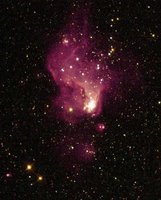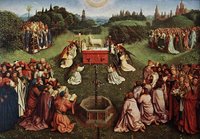Heaven: Created or Eternal?
Q: Did God create the spiritual heaven or has it existed for eternity? If it existed eternally as a self-existent, omnipresent thing, then God would not be the only self-existent, eternal, omnipresent thing. Also, if God created heaven, then why does the Bible say He dwells in heaven? If He created heaven then wouldn’t He exist outside and inside of it?
 A: You’ve captured one of the mysteries of Holy Scripture in your questions — a mystery only partially revealed from Genesis through Revelation. Truly, when we read all the instances of “heaven” in our Bibles, it seems that we view totally different things at different times.
A: You’ve captured one of the mysteries of Holy Scripture in your questions — a mystery only partially revealed from Genesis through Revelation. Truly, when we read all the instances of “heaven” in our Bibles, it seems that we view totally different things at different times.As I answer, please keep in mind that while I quote and allude to Scripture in the following response, I do so from the perspective Paul lamented: “For now we see in a mirror dimly. (1 Corinthians 13:12)” Thus, what I say is only informed speculation, not a final word.
The Bible’s first verse says, “In the beginning, God created the heavens and the earth. (Genesis 1:1)” Taken in context of the Creation account, the “heaven” here mentioned clearly means that part of the Creation above the earth, as the Psalmist says: “The heavens declare the glory of God, and the sky above proclaims his handiwork. (Psalm 19:1)”
However, other passages, speak of heaven as the Lord’s dwelling place: “Look down from your holy habitation, from heaven, and bless your people Israel and the ground that you have given us. (Deuteronomy 26:15)” Jesus tells us to pray to “Our Father in heaven. (Matthew 6:9)”
 Physical directions may bespeak spiritual connections. We associate “up” and “above” words with God, eternal life, and the resurrection and“down” and “below” words with Satan, death, and hell. The physical heaven “above” us becomes a sign of God’s heaven “beyond” our present knowing.
Physical directions may bespeak spiritual connections. We associate “up” and “above” words with God, eternal life, and the resurrection and“down” and “below” words with Satan, death, and hell. The physical heaven “above” us becomes a sign of God’s heaven “beyond” our present knowing.So let’s focus on your “spiritual” heaven — the place of our Father. Sometimes, “heaven” is almost synonymous with God, as when the Prodigal Son confessed, “Father, I have sinned against heaven and before you. (Luke 15:21)” Jesus’ narration wouldn’t have seemed odd to His listeners; they would have immediately understood the euphemism.
Both human perspective (Deuteronomy 26:15) and Christ’s point of view (Matthew 6:9) indicate heaven as the place where God specifically locates Himself in the fullness of His glory. This differs from His omnipresence throughout creation, for there is no place in the physical creation where God is absent: “‘Do I not fill heaven and earth?’ declares the Lord. (Jeremiah 23:24)”
You wonder how heaven could be a “self-existent, omnipresent thing” if only God is self-existent and omnipresent. Yet this heaven in which God is enthroned wouldn’t have to be “self-existent” in order to have always existed. Perhaps this heaven is better understood as a manifestation of God’s essence. We know it’s a place of light, of majesty, of purity. Its attributes are those of the Lord of all. Because we are so constrained by our physicality, we think of someone being in a certain place. With God and heaven, a better perspective might be thinking of heaven as a place being wherever certain “Someone” is.
 The very word “place” testifies to our earthly perspective. The old adage, “A place for everything and everything in its place,” shows how we like to organize and categorize our surroundings. We talk about dying and “going to” heaven, as if we hop on a bus and ride from Point A to Point B. It may be that we better understand heaven as “the presence of the Lord, (Job 1:12)” If this is the case, then heaven exists throughout eternity, not independent from the Lord but because God exists throughout eternity. You could thus say that heaven is created by the very presence of God.
The very word “place” testifies to our earthly perspective. The old adage, “A place for everything and everything in its place,” shows how we like to organize and categorize our surroundings. We talk about dying and “going to” heaven, as if we hop on a bus and ride from Point A to Point B. It may be that we better understand heaven as “the presence of the Lord, (Job 1:12)” If this is the case, then heaven exists throughout eternity, not independent from the Lord but because God exists throughout eternity. You could thus say that heaven is created by the very presence of God.This understanding of heaven means that wherever the Father locates Himself in the majesty of His glory, there is heaven. Our sinful eyes cannot bear the sight, our sinful selves cannot stand the presence. Only in the purity of the resurrection of all flesh will we, with Paul and all the saints, finally be able to do more than glance through a dark looking glass. This seems in line with the full quote from 1 Corinthians 13:12, as Paul laments and then rejoices: “For now we see in a mirror dimly, but then face to face. Now I know in part; then I shall know fully, even as I have been fully known.”
 We are not and will not be “in heaven” as long as we remain creatures of this fallen creation. Once remade to live in the New Creation — under “new heavens” and upon “a new earth in which righteousness dwells (2 Peter 3:13)” — we may also find ourselves in “heaven, [God’s] dwelling place. (1 Kings 8:30)” Then, as we gaze upward into “the heavens,” we’ll do so from the perspective of being forever within the presence of “our Father in heaven.”
We are not and will not be “in heaven” as long as we remain creatures of this fallen creation. Once remade to live in the New Creation — under “new heavens” and upon “a new earth in which righteousness dwells (2 Peter 3:13)” — we may also find ourselves in “heaven, [God’s] dwelling place. (1 Kings 8:30)” Then, as we gaze upward into “the heavens,” we’ll do so from the perspective of being forever within the presence of “our Father in heaven.”If this understanding is correct, God is, was, and always will be “in heaven.” Yet He still fills all Creation with His presence and purpose, working His will as He desires. And lest we forget, Scripture reveals and our Creeds confess that special time when God personally existed, as you said, “outside and inside” of heaven. For we believe “in one Lord Jesus Christ ... who for us men and for our salvation came down from heaven and was incarnate by the Holy Spirit of the virgin Mary and was made man; and was crucified also for us under Pontius Pilate. He suffered, and was buried. And the third day He rose again according to the Scriptures and ascended into heaven and sits at the right hand of the Father. (the Nicene Creed)”
Actually, God still specifically locates Himself “outside of” heaven. In Word and Sacrament, through the proclamation of His Gospel, in Baptism, Absolution, and the Lord’s Supper, Jesus is truly present with His Church as long as we dwell on earth.
Scripture quoted from The Holy Bible, English Standard Version™, © 2001 by Crossway Bibles.
Send email to Ask the Pastor.
Walter Snyder is the pastor of Holy Cross Lutheran Church, Emma, Missouri and coauthor of the book What Do Lutherans Believe.
Technorati Tags: heaven | heavens | paradise | eternity | creation | God | Nicene Creed | new creation

3 Comments:
Thank you for your explanation. So, it seems that heaven may simply be the unveiled presence of God. There is some verse, though I'm not sure which, where someone asks Jesus, "Where is heaven?" Jesus replies to the effect of, "It is not here or there, but inside of you." It seems Jesus is plainly saying that heaven is not a place in our sense of the word since He says it isn't "here or there."
Actually, Jesus told the crowd, "the kingdom of heaven is among you." This rabbi, standing in their midst, embodied heaven on earth.
Good morning Pastor. I want to ask, what about the following verses
1 Chronicles 6:18 and 2 Kings 8:27
there stated that, if the entity God, imposed in order to get into heaven. volume of spacetime spiritual, which is called paradise is not able to load the entity God.
because before God created everything including heaven. there is not any place except God. My shallow mind like this, when the heaven was created, because there is no place whatsoever except God. and because God is the giant size of the entity, without limitation / edge. then my shallow mind, believes that Heaven, once created must exist (exist / remain) in the entity body of the Lord. how about this?
then the genesis 1:1-2, I'm sure the sky there, just mention the sky (spacetime) of the world, so it is not heaven. I believe that the word "tehowm (the deep)" there is a parent of the world (home of the multiverse), that is, there is most of the world spacetime that the process of creation is told not to humans.
and when I was looking for, and I'm sure if the "water" mentioned in Genesis 1:1-2 is a metaphor (figurative language phenomenal shape and form of symbolic language) to mention "spiritual matter" and sorry, I'm sure it is the raw material universe.
then when I carefully any further, I met if the origin of "water" in the genesis 1:1-2 it is from heaven. and when I turned conscientious further "water" heaven comes directly from God (Revelation 22:1). This obviously will lead me to pantheism .... but once I got rejected, I increasingly find strong support.
I then researched hell, hell in the Bible is mentioned in later. there will be a caterpillar, fire and brimstone.
by using the concept of allegory in the Bible. I'm sure if the word "caterpillar, sulfur and fire" there is only figurative language phenomenal shape and form of symbolic language.
of the "worm" is a phenomenal animal decomposers, so "worm" used as a symbol of the spiritual body decomposition.
of "sulfur" phenomenal widely used for explosive / destructive. so also as a symbol of sulfur decomposition / destruction.
of the word "fire" phenomenal, besides also being a fire gutted purification media as the work of a blacksmith, who was able to make a new iron rusted iron without rust. so here "fire" used as a symbol of purification.
My superficial conclusions. of the phenomenal hell, I'm sure that the "spiritual matter" that make up the "spiritual body" of man is direcycle .... it means nothing is wasted.
I further affirm this case, that pantheism might be real. so as the theory of Albert Einstein .... God is Energy possibility entities.
The Bible says that God is a spirit entity (power) and is synonymous with the word energy (power) .... I do not know honestly is a dilemma.
but although this time I bit into pantheism, but I still believe if God does exist.
I use google translation, sorry if my translation be ambiguous.
Post a Comment
<< Home